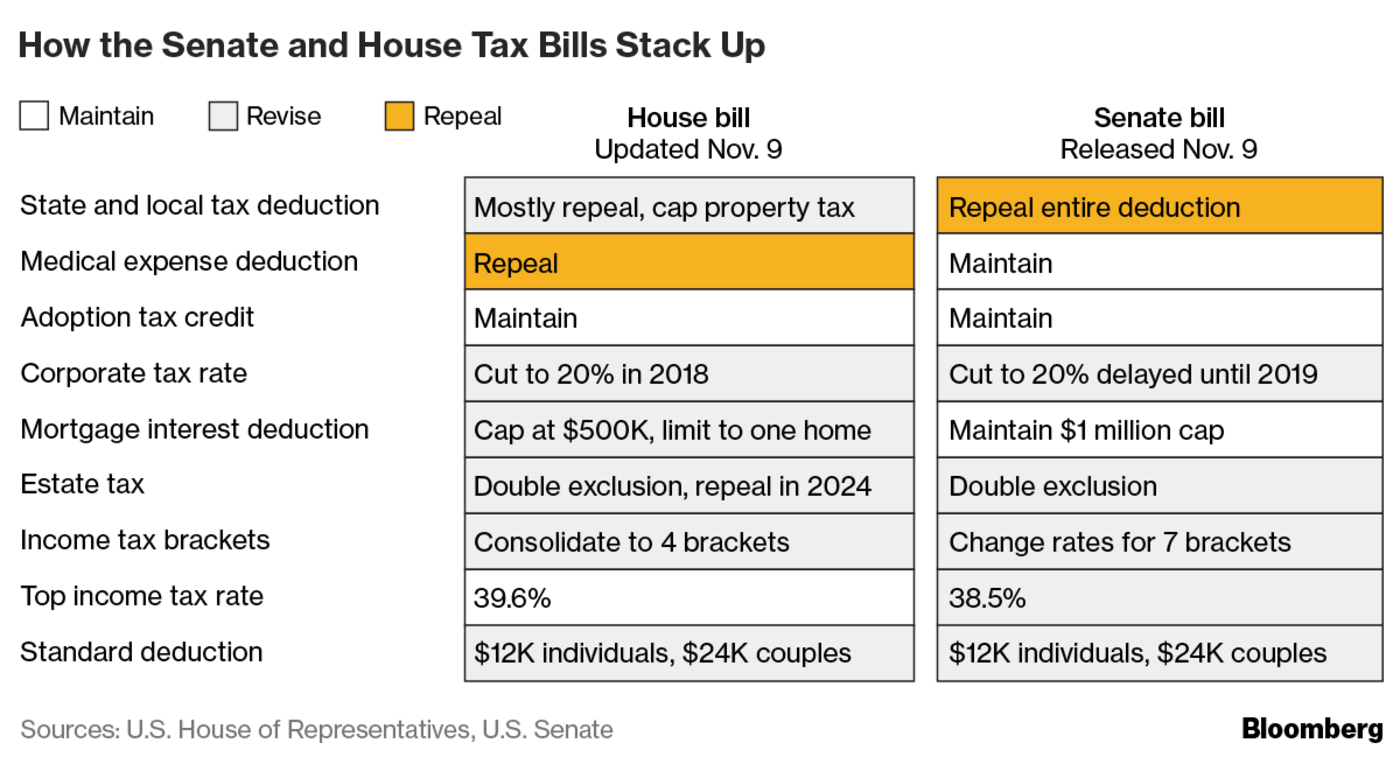By Erik Wasson and Sahil Kapur
(Bloomberg) --Senate Republicans released their vision for a tax-cut plan Thursday that would cut the corporate tax rate to 20 percent, with a one-year delay to 2019, as Congress moves quickly to fulfill one of the GOP’s biggest and most long-awaited goals.
The House proposal released a week earlier also would reduce the corporate rate to 20 percent from the current maximum of 35 percent, though it would take effect in 2018. The Ways and Means Committee approved the measure Thursday after releasing revisions. The measure could be changed again in the Rules Committee before it reaches the House floor.

The Senate plan would have seven individual tax brackets and would eliminate state and local tax deductions. The Senate Finance Committee plans to begin considering the plan early next week, while the House plans to vote on its bill next week.
A Senate summary didn’t include details on a number of business tax provisions. Here’s how the Senate proposal compares with the House version so far on some key areas, updated throughout the day:
INDIVIDUAL
Income Tax brackets
WHAT’S IN THE SENATE BILL: The Senate would include seven individual brackets of 10 percent, 12 percent, 22.5 percent, 25 percent, 32.5 percent, 35 percent and 38.5 percent. The last one would be a decrease from current law’s top individual rate of 39.6 percent. Thresholds for each bracket weren’t immediately available.
HOW THAT DIFFERS FROM THE HOUSE: The House would shrink the number of brackets to four with these thresholds for married taxpayers filing jointly: 12 percent: $24,000 to $90,000; 25 percent: $90,000 to $260,000; 35 percent: $260,000 to $1 million; 39.6 percent: $1 million and up. The thresholds would be adjusted for inflation based on chained CPI, a formula that would subject more income to higher tax rates than under the regular consumer price index.
State and Local Tax Deductions
SENATE BILL: Eliminates state and local tax deductions for individuals, according to Senator John Hoeven of North Dakota.
HOUSE BILL: The deduction for state and local income taxes or sales taxes would be repealed, while the deduction for state and local property taxes would be capped at $10,000.
Home-Mortgage Interest Deduction
SENATE BILL: Preserve the existing mortgage-interest deduction for home purchases with up to $1 million of debt.
HOUSE BILL: The home-mortgage interest deduction would be reduced for new purchases to $500,000 of debt from the current $1 million. The bill would also limit the deduction to one principal home, ending the break for second homes.
Standard Deduction
SENATE BILL: Roughly doubles the standard deduction to $12,000 for individuals and $24,000 for couples.
HOUSE BILL: Same.
Medical Expense Deduction
SENATE BILL: Preserve existing medical expense deduction and enhance the standard deduction for the blind and elderly.
HOUSE BILL: Repeal the medical expense deduction.
Child Tax Credit
SENATE BILL: Expand the credit to $1,650 from $1,000. Senator Tim Scott, a South Carolina Republican, said the credit would phase out at $500,000 income.
HOUSE BILL: Increase the credit to $1,600 per child younger than 17 -- up from $1,000 -- and includes an additional $300 credit for each parent as part of a consolidated family tax credit.
Estate Tax
SENATE BILL: Preserve the estate tax while doubling the current $5.49 million exemption for individuals.
HOUSE BILL: The estate tax would end after 2023. Before then, the current $5.49 million exemption for individuals would be doubled.
BUSINESS
Corporate Tax Cut
SENATE BILL: A corporate tax-rate cut to 20 percent would be delayed by one year to January 2019, according to GOP Senator Bill Cassidy of Louisiana.
HOUSE BILL: The corporate income tax rate would be a flat 20 percent starting in 2018.
To contact the reporters on this story: Erik Wasson in Washington at [email protected] ;Sahil Kapur in Washington at [email protected] To contact the editors responsible for this story: Joe Sobczyk at [email protected] Laurie Asséo, Justin Blum





